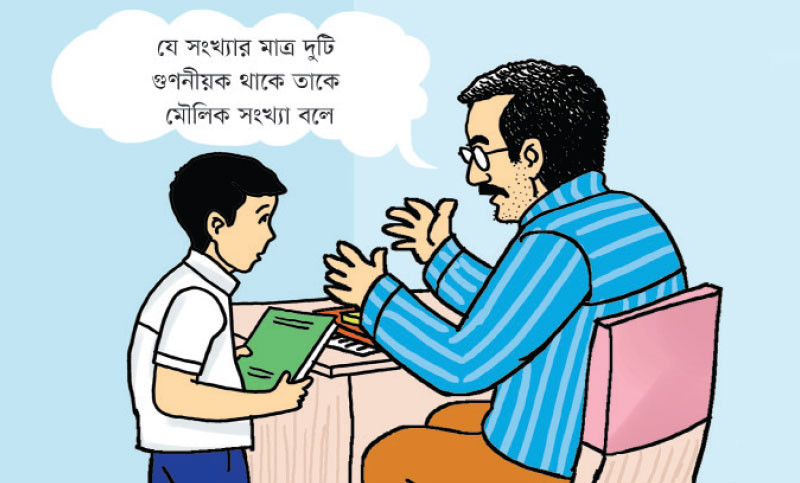গত পর্বে Completing Sentence-এর কয়েকটি মৌলিক ও বিশেষ নিয়ম ছাপা হয়েছে। শিক্ষার্থীদের দুর্বলতা কাটাতে আজ আরো কিছু বিশেষ নিয়ম নিয়ে আলোচনা করা হয়েছে।
বিশেষ নিয়ম-১ : So...that : বাক্যে ‘এত...যে’ এরূপ অর্থ থাকলে So...that ব্যবহৃত হয়। প্রথম Clause-এ so থাকলে পরবর্তী Clause ‘that’ দ্বারা শুরু হয়।
So যুক্ত Clause-টিতে উল্লিখিত কারণটির সঙ্গে সামঞ্জস্যপূর্বক ফলাফল নির্দেশক That + Clause আকারে বসাতে হয়। নতুন Clause-টি অবশ্যই প্রদত্ত Clause-এর Tense অনুসারে হবে।
Example : (i) Incomplete : The old man is so weak that...
Complete : The old man is so weak that he cannot walk.
(ii) Incomplete : The heat is so warm that—.
Complete : The heat is so warm that I can’t tolerate it.
বিশেষ নিয়ম-২ : No sooner had ... than : ‘যেতে না যেতেই’, ‘করতে না করতেই’, ‘পৌঁছতে না পৌঁছতে’ ইত্যাদি অর্থ বুঝাতে ‘No sooner + had + sub + verb-এর Past Participle form + other words + than + Past Indefinite হয়।
Example : (i) Incomplete : No sooner had he seen the tiger than—.
Complete : No sooner had he seen the tiger than he ran away.
(ii) Incomplete : No sooner had he reached the station than—.
Complete : No sooner had he reached the station than the train began to start.
বিশেষ নিয়ম-৩ : Scarcely ... when, Hardly ... when (যেই মাত্র... অমনি; সঙ্গে সঙ্গে) দিয়েও একই নিয়মে বাক্য গঠন করতে হয়।
Incomplete Sentence-এ Scarcely/hardly had + sub + verb-এর Past Participle + when থাকলে complete করার সময় Past Indefinite Tense-এর Clause হয়।
Example : (i) Incomplete : Scarcely had we reached the college when—.
Complete : Scarcely had we reached the college when the class started.
(ii) Incomplete : Hardly had we taken shelter in a tin-shed when—.
Complete : Hardly had we taken shelter in a tin-shed, when it started raining.
বিশেষ নিয়ম-৪ : So that/in order that (যাহাতে) : Complex Sentence-এর প্রথমে Clause-এ এমন কোনো বিষয় থাকে, যা একটি উদ্দেশ্য করা হয়েছে—অর্থাৎ প্রথম ঘটনাটির ফলাফল অন্য একটি ঘটনা ঘটতে পারে, এমন মনে করে, যা ঘটানোর উদ্দেশ্যে এ ধরনের ক্ষেত্রে Clause-টি so that/in order that +subject + can/could/may/might + verb-এর present form + other words-এ Structure অনুসারে হয়। So that-এর আগের অংশ Present Tense-এ থাকলে পরের অংশে can/may; কিন্তু আগের অংশ Past Tense-এ থাকলে পরের অংশে could/might হয়।
Example : (i) Incomplete : The students studied diligently so that—.
Complete : The student studied diligently so that they could secure scholarship.
(ii) Incomplete : The President speaks loudly in order that—.
Complete : The President speaks loudly in order that the audience may hear clearly.
বিশেষ নিয়ম-৫ : As long as (যতক্ষণ পর্যন্ত) যুক্ত incomplete sentencewUi সঙ্গে একটি পূর্ণাঙ্গ sentence যোগ করে প্রদত্ত incomplete sentence-কে complete করতে হয়।
Example : (i) Incomplete : Wait here as long as—.
Complete : Wait here as long as it rains.
(ii) Incomplete : The blessings of Allah will be with us as long as—.
Complete : The blessings of Allah will be with us as long as we do the duty to Him.
বিশেষ নিয়ম-৬ : The place ... where দ্বারা incomplete sentence-এ স্থান নির্দেশ করলে এর শেষে subject + verb + (extension) বসে।
Example : (i) Incomplete : Rajshahi is the place where—.
Complete : Rajshahi is the place where mangoes grow very well.
(ii) Incomplete : A railway station is the place where—.
Complete : A railway station is the where trains stop.
বিশেষ নিয়ম-৭ : In case (যদি) যুক্ত subordinate clause-টি principal clause-এর কাজের কারণ নির্দেশ করে। তাই রহ case যুক্ত incomplete sentence-কে complete করার সময় in case-এর পর principal clause-এর কারণের সঙ্গে সম্পর্কযুক্ত একটি subordinate clause গঠন করতে হয়। সাধারণত in case যুক্ত subordinate clause-টি present tense-এর হয়।
Example : (i) Incomplete : I won’t come tomorrow in case—.
Complete : I won’t come tomorrow in case it rains.
(ii) Incomplete : Keep the cell phone with you in case—.
Complete : Keep the cell phone with you in case he phones.
(iii) Incomplete : He carried an umbrella in case—.
Complete : He carried an umbrella in case it rained.
(iv) Incomplete : I waited at home in case—.
Complete : I waited at home in case he came.



